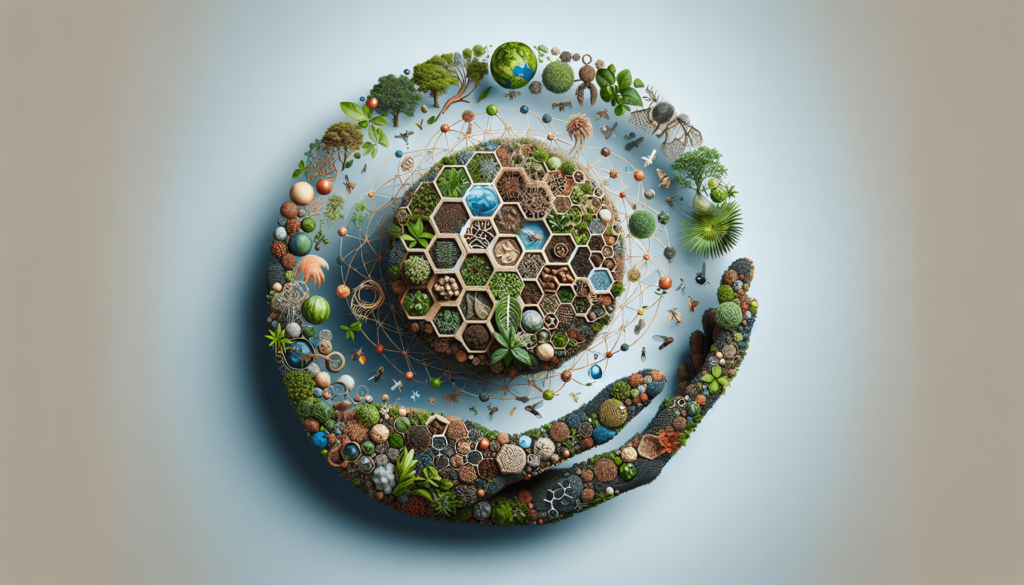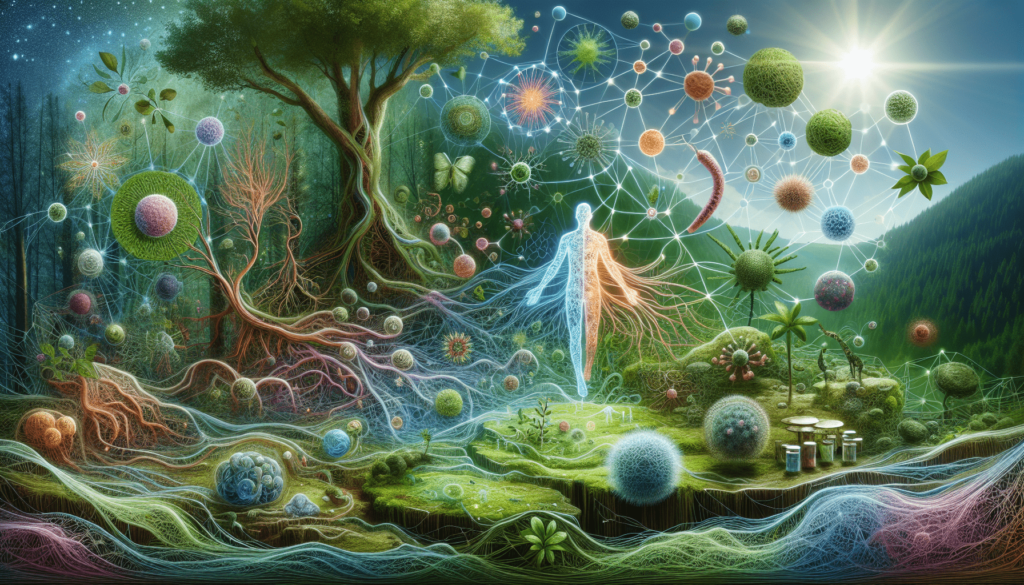Biodiversity plays a crucial role in shaping our planet and sustaining the delicate balance of ecosystems, but have you ever stopped to consider how it influences human health? From the air we breathe to the food we eat, the interconnection between biodiversity and our well-being is undeniable. In this article, we uncover the surprising ways in which the variety of life on Earth impacts our health, emphasizing the importance of preserving and safeguarding our natural environment for the benefit of both nature and ourselves. So, let’s embark on a captivating journey into the intricate world of biodiversity and its profound effects on our well-being.

Impact of Biodiversity on Disease Control
Vector control and disease transmission
Biodiversity plays a crucial role in disease control as it influences the behavior and population dynamics of disease vectors such as mosquitoes, ticks, and flies. Maintaining a diverse ecosystem can help regulate vector populations by providing natural predators and competitors that keep their numbers in check. This reduces the risk of disease transmission, particularly in areas where vector-borne diseases like malaria, dengue fever, and Lyme disease are prevalent. By preserving biodiversity and natural habitats, we can effectively manage and control the spread of these diseases, ensuring the health and well-being of human populations.
Emerging diseases and zoonotic infections
Emerging infectious diseases, including a significant proportion of zoonotic infections, pose a growing threat to global public health. Biodiversity plays a critical role in regulating and mitigating the emergence and spread of such diseases. Healthy ecosystems act as buffers, minimizing the contact between humans and wildlife species that may harbor potentially harmful pathogens. When ecosystems are disturbed or destroyed, species come into closer contact with humans, increasing the risk of zoonotic spillover. By protecting and preserving biodiversity, we can reduce the chances of emerging diseases and zoonotic infections, safeguarding both human and wildlife health.
Benefits of Access to Natural Areas
Physical health benefits
Having access to natural areas, such as parks, forests, and green spaces, offers numerous physical health benefits. Engaging in outdoor activities in these natural environments promotes physical exercise, leading to improved cardiovascular health, increased muscular strength, and enhanced overall fitness. Research has shown that spending time in nature can help reduce the risk of chronic diseases, including obesity, diabetes, and hypertension. Furthermore, exposure to sunlight in natural areas allows our bodies to produce vitamin D, essential for maintaining strong bones and a healthy immune system. By enjoying the beauty and serenity of natural areas, we not only improve our physical health but also enhance our overall quality of life.
Mental health benefits
In addition to physical health benefits, access to natural areas also has a profound impact on our mental well-being. Being in nature has a restorative effect on our minds, reducing stress, anxiety, and depression. The tranquility and beauty of natural environments provide a sense of calmness and relaxation, allowing us to escape from the pressures and demands of daily life. Nature has a positive effect on our cognitive function, improving attention, concentration, and creativity. Studies have shown that spending time in natural areas can even boost our mood and self-esteem. Therefore, maintaining and preserving natural areas is crucial not only for our physical health but also for promoting mental well-being.

Medicines and Pharmaceutical Innovation
Direct use of biodiversity in medicine
Biodiversity is a vast source of natural compounds that have been used for centuries in traditional medicine and continue to inspire modern pharmaceutical innovation. Many of our most effective medications are derived from plants, animals, and microorganisms found in various ecosystems. For example, the anti-cancer drug Taxol was originally isolated from the Pacific Yew tree, and the powerful painkiller morphine comes from the opium poppy. Biodiversity provides a rich reservoir of biochemical diversity, offering countless possibilities for the discovery and development of new medicines. By preserving biodiversity, we not only protect valuable medicinal resources but also ensure a continuous supply of therapeutic options for future generations.
Traditional medicine and indigenous knowledge
Indigenous communities around the world have developed an intricate understanding of the medicinal properties of biodiversity through their traditional healing practices. Their knowledge, often passed down through generations, is a treasure trove of information on the uses and benefits of various plants, animals, and fungi. Incorporating traditional medicine into modern healthcare systems can benefit both local communities and global pharmaceutical advancements. By recognizing and respecting indigenous knowledge and practices, we can promote cultural diversity, protect traditional healing practices, and harness the potential of biodiversity for the well-being of all.
Nutrition and Food Security
Dietary diversity and micronutrient intake
Biodiversity plays a crucial role in ensuring nutrition and food security by providing a wide range of fruits, vegetables, grains, and animal products. A diverse diet, rich in different food groups, ensures an adequate intake of essential nutrients, including vitamins, minerals, and antioxidants. By relying on a limited number of crops or livestock species, we risk malnutrition and nutrient deficiencies. Maintaining biodiversity in our agricultural systems allows us to cultivate a variety of crops and rear diverse livestock breeds, ensuring a resilient and nutritious food supply for all.
Crop pollination and agriculture
Pollinators, such as bees, butterflies, and birds, are essential for the reproduction of flowering plants, including many of our crop species. These pollinators facilitate the transfer of pollen, enabling plants to produce fruits, seeds, and other agricultural products. Without the presence of diverse pollinator species, crop yields would significantly decline, leading to food shortages and economic losses. Preserving biodiversity in agricultural landscapes is crucial to maintaining healthy pollinator populations and ensures the continued productivity and sustainability of our food systems.

Human Well-being and Quality of Life
Cultural and spiritual well-being
Biodiversity is deeply intertwined with our cultural and spiritual well-being. Many traditional cultures and indigenous communities have strong cultural connections and spiritual beliefs centered around nature and biodiversity. The landscapes, ecosystems, and species they coexist with hold immense cultural and spiritual significance, shaping their identity and way of life. The loss of biodiversity can erode cultural diversity and disrupt these deep-rooted connections. By preserving biodiversity, we not only protect the physical environment but also safeguard the cultural heritage and spiritual well-being of communities around the world.
Social cohesion and community resilience
Biodiversity plays a vital role in supporting social cohesion and fostering community resilience. Natural areas, such as parks and green spaces, provide spaces for community gatherings, recreational activities, and social interactions. These shared spaces strengthen social bonds, promote a sense of belonging, and enhance community well-being. Additionally, diverse ecosystems contribute to the resilience of communities by providing essential ecosystem services, such as clean water, fertile soil, and climate regulation. By valuing and conserving biodiversity, we can build stronger, more resilient communities that thrive in harmony with nature.
Ecotourism and Economic Importance
Tourism revenue and job creation
Biodiversity-rich areas attract tourists from around the world, generating significant revenue and creating employment opportunities for local communities. Ecotourism, which focuses on nature-based tourism in pristine and diverse ecosystems, offers a sustainable alternative to traditional tourism that often comes at the expense of the environment. By promoting ecotourism, we can harness the economic potential of biodiversity while simultaneously protecting and conserving natural areas. This ensures the long-term viability of the tourism industry, creates jobs, and supports local economies.
Ecosystem services and economic value
Biodiversity provides a multitude of essential ecosystem services that have substantial economic value. Services such as water purification, soil fertility, and climate regulation are all underpinned by diverse ecosystems. By conserving biodiversity, we can reduce the costs associated with providing these services artificially. Protecting and restoring natural habitats can also contribute to mitigating climate change and reducing the impact of natural disasters, further enhancing their economic value. Recognizing the economic importance of biodiversity not only provides incentives for conservation but also allows for the sustainable use and management of natural resources.

Climate Change Adaptation
Biodiversity’s role in climate regulation
Biodiversity plays a fundamental role in mitigating climate change by regulating the Earth’s climate system. Forests, for instance, serve as carbon sinks, absorbing and storing vast amounts of carbon dioxide, a greenhouse gas responsible for global warming. Additionally, diverse ecosystems such as wetlands and mangroves act as natural buffers against extreme weather events, absorbing and dissipating the impacts of storms, floods, and hurricanes. By preserving and restoring biodiversity-rich habitats, we can enhance the resilience of ecosystems to climate change and reduce the severity of its effects on human populations.
Natural disaster mitigation
Biodiverse ecosystems provide essential services in mitigating the impacts of natural disasters. Coastal ecosystems, such as coral reefs and mangroves, act as natural barriers, protecting coastal communities from the destructive power of tsunamis and storm surges. Similarly, forests and wetlands can reduce the risk of landslides and floods by absorbing excess rainfall and stabilizing slopes. By safeguarding biodiversity and restoring degraded ecosystems, we can enhance our resilience to natural disasters, ensuring the safety and well-being of communities living in vulnerable areas.
Air and Water Quality
Biodiversity’s role in air purification
Biodiversity plays a crucial role in maintaining air quality through various mechanisms. Forests, for example, act as natural filters, removing pollutants from the air and producing oxygen through photosynthesis. Healthy ecosystems also help regulate air quality by reducing the concentration of harmful gases, such as carbon dioxide and nitrogen oxides, which contribute to climate change and air pollution. By protecting and preserving biodiversity-rich areas, we can improve air quality, minimize the impact of air pollution on human health, and create cleaner and healthier environments.
Effects on water filtration and purification
Biodiversity is essential for maintaining the quality and availability of freshwater resources. Wetlands, for instance, act as natural water filters, removing pollutants and improving water quality. They also serve as natural reservoirs, replenishing groundwater sources and regulating water flow during periods of drought or heavy rainfall. Diverse ecosystems help prevent soil erosion, which can lead to sedimentation and contamination of water bodies. By conserving biodiversity, we can protect our water resources, enhance water quality, and ensure sustainable access to clean and safe drinking water for communities around the world.

Education and Scientific Research
Biodiversity education and awareness
Biodiversity education is crucial in fostering an understanding and appreciation for the importance of biodiversity in our daily lives. By educating people about the value of biodiversity, we can inspire them to take action and contribute to its conservation. Learning about the interconnectedness of species and ecosystems promotes a sense of responsibility and empowers individuals to make informed choices that support biodiversity conservation efforts. By raising awareness and promoting biodiversity education, we can shape a society that values and prioritizes the protection and conservation of our natural heritage.
Bioprospecting and genetic research
Biodiversity serves as a rich reservoir of genetic diversity that can be harnessed for scientific research and bioprospecting. Studying the genetic makeup of various species provides valuable insights into their adaptations, evolutionary history, and potential applications in various fields, including medicine, agriculture, and biotechnology. By conducting research on biodiversity, we can uncover new solutions to pressing global challenges and develop innovative technologies. However, it is crucial to approach bioprospecting and genetic research in a responsible and sustainable manner, ensuring that the benefits are shared equitably and without causing harm to the ecosystems from which these resources are derived.
Conservation and Sustainable Development
Conservation of ecosystems and species
Conserving ecosystems and species is vital for maintaining the delicate balance of nature. By protecting biodiversity-rich areas, we preserve the habitats and ecosystems that support countless species, many of which are keystone or indicator species. Ecosystems are complex networks of interactions, where the loss of a single species can have far-reaching consequences. Conserving biodiversity ensures the long-term survival and resilience of these ecosystems, allowing them to continue providing essential services to humans and the planet.
Sustainable resource management
Sustainable resource management is essential to ensure the continued availability of natural resources without depleting them or causing environmental harm. By adopting sustainable practices, we can use natural resources in a way that minimizes negative impacts on biodiversity and ecosystems. This includes responsible fishing practices, sustainable forestry, and sustainable agriculture. Moreover, sustainable resource management involves considering the social, economic, and environmental aspects of resource use, balancing the needs of the present generation without compromising the ability of future generations to meet their own needs.
In conclusion, the impact of biodiversity on human health and well-being is remarkable and multifaceted. From disease control to cultural well-being, biodiversity plays a crucial role in shaping our lives and ensuring a sustainable future. By recognizing the immense value of biodiversity and taking action to protect and preserve it, we can guarantee a healthier, more prosperous, and harmonious coexistence with the natural world.




